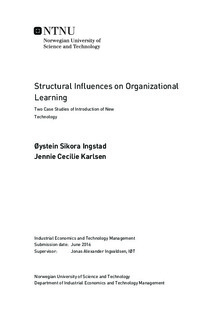Structural Influences on Organizational Learning - Two Case Studies of Introduction of New Technology
Master thesis
Permanent lenke
http://hdl.handle.net/11250/2433845Utgivelsesdato
2016Metadata
Vis full innførselSamlinger
Sammendrag
Staying at the forefront of technological advancement is critical for a broad range of organizations based in high-cost countries, such as Norway. They must continuously develop and integrate new technology into their existing production systems. This introduction of new technology requires learning in several parts of the organization. However, current models of organizational learning fail to explain the learning processes that takes place during introduction of new technology. Furthermore, the prevalent view regarding the structural influences on organizational learning seems underdeveloped with respect to introduction of new technology. Organizations are encouraged to reduce formalization and decentralize authority to increase their organizational learning capabilities. This seems counterproductive for organizations that develop new technology in functionally differentiated R&D units and seek to integrate this technology in large, interdependent production systems.
To address these issues, this thesis empirically examines the structural influences on organizational learning during introduction of new technology. Through a comparative case study, two technology introduction projects are analyzed in detail.
Four processes are found to contribute to organizational learning during technology introduction: technology development is fundamental for the organization to acquire necessary knowledge, extensive prob- lem identification is important to fully understand technical problems, the organization must find and connect relevant knowledge, skills and technological artefacts across its units, and to integrate technology the organization must be effective at combining knowledge from R&D with knowledge from operations. Each of these learning processes are influenced differently by different elements of the organizational structure. Differentiated R&D units positively influence the ability to develop new technology. However, this have a negative influence on the ability to find and connect the relevant resources. This challenge can be mitigated by having an integrating manager responsible for governing the relevant units. Too narrowly defined performance metrics negatively influence operations ability to identify the cause of their problems. The success of technology integration is positively influenced by a formalized interface in the form of a liaison position based in R&D.
Thus, some level of formalization and authority will in fact enhance organizational learning processes during introduction of new technology.
